鲁教版英语七年级上Unit1-2知识点总结
鲁教版(五四学制)七年级上册英语期末复习各单元知识点提纲(实用,必备!)
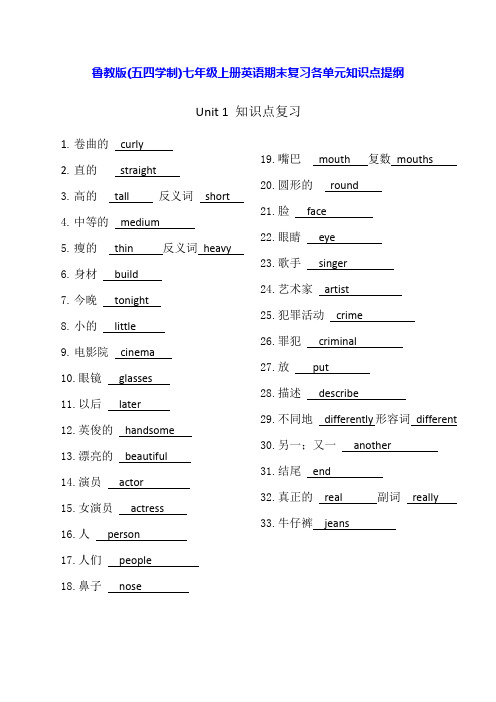
鲁教版(五四学制)七年级上册英语期末复习各单元知识点提纲Unit 1 知识点复习Unit 2 知识点整理短语必备1.散步went for a walk2.挤奶milked a cow3.喂鸡fed chickens4.骑马rode a horse5.拍照took some photos6.很多quite a lot7.太多乐趣so much fun 8.带领某人参观show sb. around 9. 和农民交谈talked with a farmer 10.你真幸运lucky you11.出现come out 12.在乡下in the countryside13.在晚上看星星watch the stars at night 14.去钓鱼went fishing 15.爬山climb a mountain 16.参观消防站visit a fire station 17.沿途along the way 18.令人兴奋的一天an exciting day19..学了很多关于机器人的知识learn a lot about robots20.教我们如何制作机器人模型taught us how to make a model robot21.给某人买某物buy sth for sb.=buy sb. sth22. 太多人too many people 23.总的说来all in all24..一点也不not at all 25.下象棋play chess26.对...感兴趣be interested in 对...不感兴趣be not interested in句子必会1.-你看到奶牛了吗?Did you see any cows?-是的;我看到了很多。
Yes,I did.I saw quite a lot.2.卡罗尔摘了一些草莓并且把它们带回了家。
Carol picked some strawberries and took them home.3.随后,导游教我们如何做机器人模型。
鲁教七上前4个单元知识点

Unit1What does he look like?[短语归纳]1.short hair短发2long hair长发3.curly hair卷发4straight hair直发5.medium height中等个子6.medium build中等身材7.go to the movie去看电影8.a little有点儿9.look like看起未像10.a big nose大鼻子11.a small mouth小嘴巴12a round face一张圆脸13.black hair黑发14.big eyes大眼睛15.long face长脸16.the same way同样的方式17.in the end最后18.blonde hair金色的头发[用法集萃]1.What does,do+主语+look like?...上去什么样?2.sb.+be of+medium build/height某人中等身材/个子3.sb.+has+adj+hair某人留着…头发[典句必背]1.---What doe she look like?他长什么样?一He’s really tall.他真的很高。
2 -Do they have straight or curly hair?他们留直发还是卷发?一They have curly hair.他们留卷发。
3. ---Is he tall or short?他高还是矮?一He isn’t tall or short.He’s of medium height.他不高不矮,他中等个子。
1.询问和描述某人的外貌特征What do/does+主语+look like?...看上去什么样?"/...什么样?”答:主语+be+描述人物外在特点的形容词。
主语+have/has+名词(名词前可有多个形容词修饰).1)What does your friend look like?你朋友长什么样?He is short and thin and has short,black hair.他又矮又瘦,留着短黑发。
鲁教版七年级上英语各单元重要概念总结
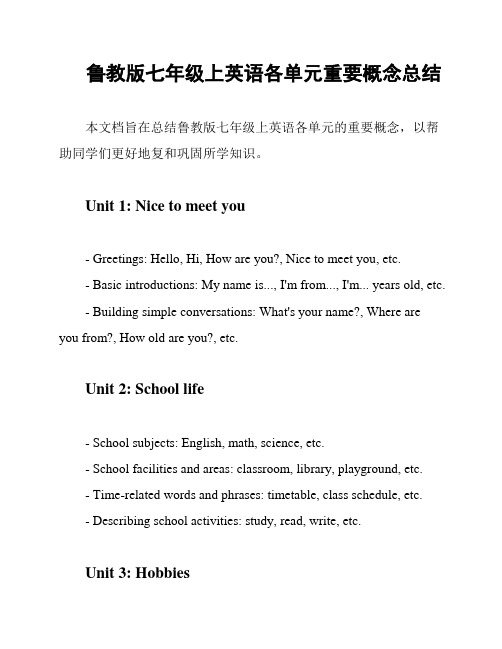
鲁教版七年级上英语各单元重要概念总结本文档旨在总结鲁教版七年级上英语各单元的重要概念,以帮助同学们更好地复和巩固所学知识。
Unit 1: Nice to meet you- Greetings: Hello, Hi, How are you?, Nice to meet you, etc.- Basic introductions: My name is..., I'm from..., I'm... years old, etc.- Building simple conversations: What's your name?, Where are you from?, How old are you?, etc.Unit 2: School life- School subjects: English, math, science, etc.- School facilities and areas: classroom, library, playground, etc.- Time-related words and phrases: timetable, class schedule, etc.- Describing school activities: study, read, write, etc.Unit 3: Hobbies- Leisure activities: play sports, listen to music, watch movies, etc.- Expressing likes and dislikes: I like..., I don't like..., etc.- Talking about frequency: always, usually, sometimes, etc.Unit 4: At home- Home and rooms: living room, bedroom, kitchen, etc.- Furniture and household items: table, chair, bed, etc.- Describing home activities: cook, clean, watch TV, etc.- Simple prepositions: in, on, under, etc.Unit 5: My family- Vocabulary related to family members: father, mother, brother, etc.- Describing family relationships: He is my father, She is my sister, etc.- Talking about family members' occupations: My dad is a doctor, etc.Unit 6: Food and drinks- Food and beverages: rice, noodles, milk, water, etc.- Talking about preferences: I like..., I don't like..., etc.- Expressing hunger and thirst: I'm hungry/thirsty, etc.Unit 7: Daily routines- Daily activities: get up, have breakfast, go to school, etc.- Adverbs of frequency: always, usually, sometimes, etc.- Describing the time: morning, afternoon, evening, etc. Unit 8: Weather- Weather conditions: sunny, rainy, cloudy, etc.- Talking about the seasons: spring, summer, fall, winter, etc. - Describing the temperature: hot, cold, warm, etc.以上是鲁教版七年级上英语各单元的重要概念总结。
鲁教版七年级上英语各单元重要知识摘要

鲁教版七年级上英语各单元重要知识摘要Unit 1: Personal Information- Learn to introduce yourself and others.- Practice asking and answering questions about personal information like name, age, and nationality.- Memorize basic greetings and farewells.Unit 2: School Life- Learn vocabulary related to school subjects, classrooms, and school facilities.- Practice talking about classroom activities and daily routines.Unit 3: Hobbies and Interests- Learn vocabulary related to hobbies and interests.- Practice describing hobbies and interests.- Utilize question forms to discuss likes and dislikes.Unit 4: Family and Friends- Learn vocabulary related to family members and relationships.- Practice talking about family members and friends.- Use possessive pronouns to describe family relationships.Unit 5: Daily Life- Learn vocabulary related to daily activities and chores.- Practice talking about daily routines and household chores.- Understand and use time expressions to talk about daily activities.Unit 6: Food and Drinks- Learn vocabulary related to food and drinks.- Practice ordering food and drinks in a restaurant.- Understand and use food-related expressions and phrases.Unit 7: Holidays and Celebrations- Learn vocabulary related to holidays and celebrations.- Practice talking about favorite holidays and traditions.- Use present simple tense to describe holiday activities.Unit 8: Travel and Transportation- Learn vocabulary related to travel and transportation.- Practice asking for and giving directions.- Use prepositions to indicate location and movement.Unit 9: Daily Activities- Review vocabulary related to daily activities.- Practice talking about past habits and routines.- Use past simple tense to describe past activities.Unit 10: Health and Fitness- Learn vocabulary related to health and fitness.- Practice talking about staying healthy and physical activities. - Utilize imperative forms to give advice and instructions.以上是鲁教版七年级上英语各单元的重要知识摘要。
初一英语上册鲁教版知识点总结
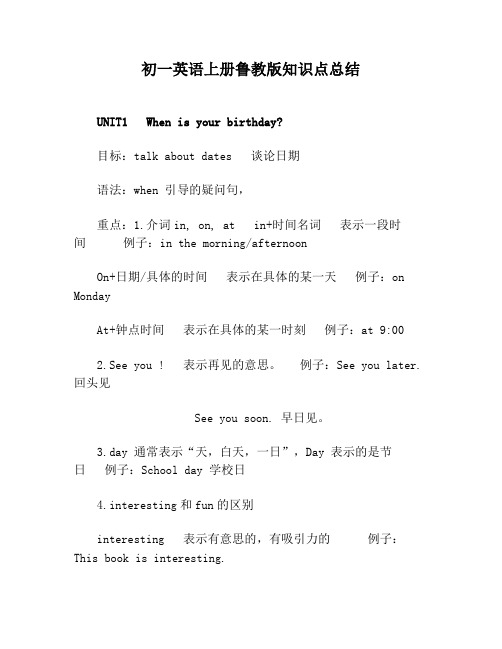
初一英语上册鲁教版知识点总结UNIT1 When is your birthday?目标:talk about dates 谈论日期语法:when 引导的疑问句,重点:1.介词in, on, at in+时间名词表示一段时间例子:in the morning/afternoonOn+日期/具体的时间表示在具体的某一天例子:on MondayAt+钟点时间表示在具体的某一时刻例子:at 9:002.See you ! 表示再见的意思。
例子:See you later. 回头见See you soon. 早日见。
3.day 通常表示“天,白天,一日”,Day 表示的是节日例子:School day 学校日4.interesting和fun的区别interesting 表示有意思的,有吸引力的例子:This book is interesting.Fun 表示有趣的,使人快乐的例子:This book makes me fun.5.can 表示可以,能够情态动词UNIT2 My favorite subject is science.目标:谈论表现,给出理由语法:what who why引导的疑问句,给出相对应的答案重点:1.How’s your day ?朋友见面时的打招呼2.have+学科表示上某一学科的课例子:have math 上数学课3.the next day 表示接下来的一天,第二天例子:We will have a game the next day .4.That’s for sure.正确,是真的,确实如此。
例子:Tom is beautiful. That’s for sure.5.from...to... 表示从...到... 描述时间地点的范围例子:from Monday to Friday6.书信的格式:开头人名前要加Dear 落款加your friend7. Class和lesson的区别:两者都可以表示学校的课,但是lesson表示有技巧的课,教材中的教学单元,比如 dance lessons 舞蹈课lesson1 第一单元UNIT3 Can you play the guitar?目标:谈论能力语法:Can 引导的疑问句重点:join表示参加社团和组织例子:join the CBA 加入CBAPlay+球类运动例子:play basketballPlay+the+乐器例子:play the guitarBe good at doing 表示擅长。
鲁教版英语七年级上Unit1-2知识点总结

1、现在进行时态:结构:主语+be动词+动词ing+其她2、现在分词得构成规则如下:1)一般动词后直接加-ing、如:reading, watching, seeing2)以不发音得e结尾得词去掉e再加-ing、如: make—making write—writing3)以重读、闭音、单辅音字母结尾得词,双写这个辅音字母,再加-ing、如: get-getting swim-swimming put-putting run-running3、用法:1)表示现在(说话瞬间)正在进行或发生得动作。
(不能指状态。
)2)表示现阶段正在进行,而此刻不一定在进行得动作。
(以these days为代表)3)表即将发生得动作。
这类词有:come, go, leave, arrive等,常与表将来得时间状语连用。
4、常见标志:1) 句中有:now, at the moment,these days,look,listen等如:He is doing his homework now、Look, what is the girl drawing?5、现在进行时得一般疑问句及回答:一般疑问句把be动词提前;回答用Yes,主语+be或No, 主语+be+no t。
如:Are you making the bed? Yes, I am、Is the girl drawing a picture? No, she isn’t、6、现在进行时得否定句:在be动词后加not。
如:They are cleaning the classroom、→They aren’t cleaning the classroom、7、对现在进行时得谓语动词提问,常用“what…doing”。
如:He is reading a book、→What is he doin g 、wait for等候talk to与…… 谈话talk about谈论go to the movies去瞧电影write a letter写一封信reading a book瞧书here is a photo of my family 、这就是我家得一张照片in the next photo 在下张照片上play basketball 打篮球watch TV 瞧电视play computer games 玩电脑游戏take photos 照相play the guitar 弹吉她have a good time=have fun =have a good time 玩得开心重点句子1.What are you/they doing?您们/她们在做什么?2.What is he/she doing?她/她在做什么?3.I'm watching TV、我正在瞧电视。
七年级上册英语1~2单元知识总结

七年级上册英语1~2单元知识总结一、Unit 1 My name's Gina.(一)重点单词。
1. name.- 名词,意为“名字;名称”。
例如:My name is Tom.(我的名字是汤姆。
)2. nice.- 形容词,意为“令人愉快的;宜人的”。
常用来形容人或事物给人的感觉。
例如:Nice to meet you.(很高兴见到你。
)3. to.- 这里是不定式符号,常用在一些固定搭配中,如“Nice to meet you.”中的“to”,无实际意义。
4. meet.- 动词,意为“遇见;相逢”。
例如:I meet my friend at the school gate.(我在学校门口遇见我的朋友。
)5. too.- 副词,意为“也;又;太”。
作“也”讲时,用于肯定句末。
例如:I'm fine, too.(我也很好。
)作“太”讲时,用来修饰形容词或副词。
例如:The box is too heavy.(这个盒子太重了。
)6. your.- 形容词性物主代词,意为“你的;你们的”,后面必须接名词。
例如:Your book is on the desk.(你的书在桌子上。
)7. his.- 形容词性物主代词,意为“他的”。
例如:His name is Jack.(他的名字是杰克。
)8. her.- 形容词性物主代词,意为“她的”。
例如:Her pen is red.(她的钢笔是红色的。
)(二)重点短语。
1. name's = name is.- 用于介绍自己的名字。
例如:My name's Gina. = My name is Gina.(我的名字是吉娜。
)2. Nice to meet you.- 初次见面时的常用问候语,回答是“Nice to meet you, too.”(很高兴见到你。
见到你也很高兴。
)3. last name.- 意为“姓”,也可以说“family name”。
鲁教版七年级英语上册Unit1复习资料
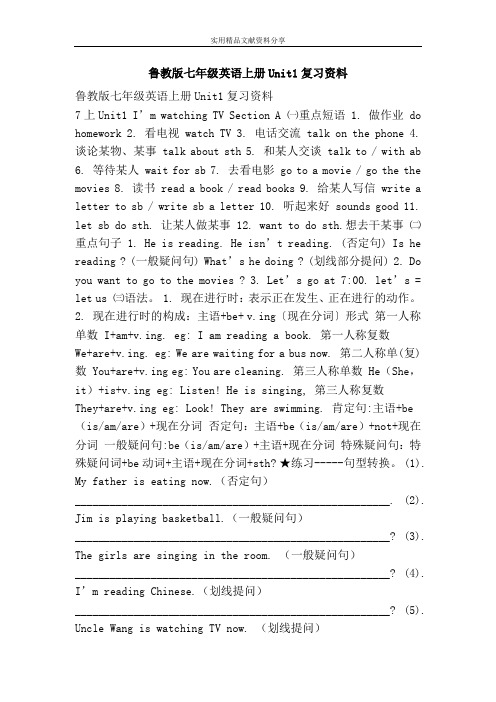
鲁教版七年级英语上册Unit1复习资料鲁教版七年级英语上册Unit1复习资料7上Unit1 I’m watching TV Section A ㈠重点短语 1. 做作业 do homework 2. 看电视 watch TV 3. 电话交流 talk on the phone 4. 谈论某物、某事 talk about sth 5. 和某人交谈 talk to / with ab 6. 等待某人 wait for sb 7. 去看电影 go to a movie / go the the movies 8. 读书 read a book / read books 9. 给某人写信 write a letter to sb / write sb a letter 10. 听起来好 sounds good 11. let sb do sth. 让某人做某事 12. want to do sth.想去干某事㈡重点句子1. He is reading. He isn’t reading. (否定句) Is he reading ? (一般疑问句) What’s he doing ? (划线部分提问) 2. Do you want to go to the movies ? 3. Let’s go at 7:00. let’s = let us ㈢语法。
1. 现在进行时:表示正在发生、正在进行的动作。
2. 现在进行时的构成:主语+be+ v.ing〔现在分词〕形式第一人称单数 I+am+v.ing. eg: I am reading a book. 第一人称复数We+are+v.ing. eg: We are waiting for a bus now. 第二人称单(复)数 You+are+v.ing eg: You are cleaning. 第三人称单数 He(She,it)+is+v.ing eg: Listen! He is singing, 第三人称复数They+are+v.ing eg: Look! They are swimming. 肯定句:主语+be (is/am/are)+现在分词否定句:主语+be(is/am/are)+not+现在分词一般疑问句:be(is/am/are)+主语+现在分词特殊疑问句:特殊疑问词+be动词+主语+现在分词+sth? ★练习-----句型转换。
鲁教版七年级上册英语知识点
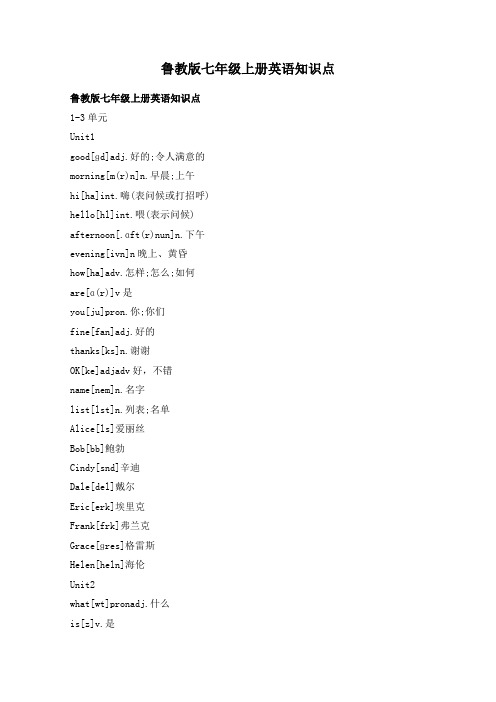
鲁教版七年级上册英语知识点鲁教版七年级上册英语知识点1-3单元Unit1good[ɡd]adj.好的;令人满意的morning[m(r)n]n.早晨;上午hi[ha]int.嗨(表问候或打招呼)hello[hl]int.喂(表示问候)afternoon[.ɑft(r)nun]n.下午evening[ivn]n晚上、黄昏how[ha]adv.怎样;怎么;如何are[ɑ(r)]v是you[ju]pron.你;你们fine[fan]adj.好的thanks[ks]n.谢谢OK[ke]adjadv好,不错name[nem]n.名字list[lst]n.列表;名单Alice[ls]爱丽丝Bob[bb]鲍勃Cindy[snd]辛迪Dale[del]戴尔Eric[erk]埃里克Frank[frk]弗兰克Grace[ɡres]格雷斯Helen[heln]海伦Unit2what[wt]pronadj.什么is[z]v.是this[s]pron.adj.这;这个in[n]prep.用(表方法、媒介、工具等) English[ɡl]n.英语it[t]pron.它a[,e]art.(辅音音素前)一个(把,台) an[n](元音音素前)一个(把,台)map[mp]n.地图orange[rnd]n.橘子、橙子jacket[dkt]n.夹克衫key[ki]n.钥匙quilt[kwlt]n.被子pen[pen]n.钢笔ruler[rulr]n.直尺spell[spel]v.拼写;拼字please[pliz]v.请Unit3color[kl(r)]n.色;颜色red[red]adj.n.红色(的)yellow[jel]adj.n.黄色(的)green[ɡrin]adj.n.绿色(的)blue[blu]adj.n.蓝色(的)black[blk]adj.n.黑色(的)white[wat]adj.n.白色(的)and[nd]conj.和;又;而且the[i][]art.表特指的人、物或群体鲁教版七年级上册英语单词表4-6单元 Unit4my[ma]pron.我的clock[klk]n.时钟nice[nas]adj.好的;令人愉快的meet[mit]v.遇见;相逢your[j(r)]pron.你的;你们的his[hz]pron他的her[h(r)]pron她的question[kwestn]n.问题;难题;询问 answer[ɑns(r)]n.回答;答复;答案 look[lk]v.看;望;看起来first[f(r)st]num.第一last[lɑst]adj最后的;上一个的boy[b]n.男孩girl[ɡ(r)l]n.女孩zero[zir]numn.零one[wn]num.一two[tu]num.二three[ri]num.三four[f(r)]num.四five[fav]num.五six[sks]num.六seven[sevn]num.七eight[et]num.八nine[nan]num.九telephone[telfn]n.电话number[nmb(r)]n.数;数字card[kɑ(r)d]n.卡;卡片;纸牌family[fmli]n.家;家庭unit5pencil[pensl]n.铅笔book[bk]n.书eraser[rez]n.橡皮case[kes]n.盒;箱;橱backpack[bkpk]n.双肩背包pencilsharpener[penslɑ(r)pn(r)]铅笔刀;卷笔刀dictionary[dknr]n.字典that[t]pron.那个yes[jes]adv.是No[n]adv.不;不是not[nt]adv.(构成否定句)不是excuse[kskjuz]v.原谅;宽恕thank[k]v.感谢OK[ke]interj.好的do:[du]v.aux做;干;构成疑问句和否定句的助动词 baseball[besbl]n.棒球watch[wt]n.手表computer[kmpjut(r)]n.电脑,电子计算机game[ɡem]n.运动;游戏notebook[ntbk]n.笔记本ring[r]n.戒指;环状物call[kl]v.打电话at[t]prep.在里面;在(点、刻);以in[n]prep.在..里面lost[lst]v.遗失found[fand]v.找回school[skul]n.学校set[set]n.(一)套of[v]prep.(属于)的Unit6sister[sst(r)]n.姐;妹motherm(r)]n.妈妈;母亲father[fɑ(r)]n.爸爸;父亲parent[pernt]n.父亲或母亲brother[br(r)]n.兄;弟grandfather[ɡrndfɑ(r)]n.祖父;外祖父grandmother[ɡrndm(r)]n.祖母;外祖母friend[frend]n.朋友grandparent[ɡrndpernt]n.祖父母;外祖父母 those[z]pron.那些these[i:z]pron.这些she[i:]pron.她he[hi:]pron.他aunt[ɑnt]n.姨母;姑母;伯母;舅母son[sn]n.儿子cousin[kzn]n.堂(表)兄弟;堂(表)姐妹daughter[dt(r)]n.女儿uncle[kl]n.叔;伯;舅;姨父;姑父picture[pkt(r)]n.照片;图画dear[d]n.亲爱的for[f(r)]prep.为了photo[ft]n.照片;here[h]adv.这里Dave[dev]n.戴维Anna[n]n.安娜Paul[pl]n.保罗Emma[em]n.埃玛Mona[mn]n.莫娜鲁教版七年级上册英语单词表7-10单元Unit7where[we]adv.在哪里table[tebl]n.桌子bed[bed]n.床dresser[dres(r)]n.梳妆台 bookcase[bkkes]n.书橱sofa[sf]n.沙发chair[te]n.椅子drawer[dr(r)]n.抽屉plant[plɑnt]n.植物under[nd(r)]prep.在之下 they[e]pron.他们on[n]prepl在上know[n]v.知道;了解bag[bɡ]n.书包;提包math[m]n.数学alarm[lɑ(r)m]clock闹钟 video[vd]n.录像;视频tape[tep]n.录音带hat[ht]n.帽子take[tek]v.拿走;带到thing[]n.东西to[tu]prep.朝;向mom[mm]n.妈妈can[kn]v.能;会;可以bring[br]v.拿来;取来some[sm]pron.一些;若干 need[nid]v.需要floor[fl(r)]n.地板room[rum]n.房间TV[tivi]n.电视desk[desk]n.书桌Tommy[tm]n.汤米Sally[sl]n.萨莉unit8have[hv]v.有soccer[sk(r)]n.英式足球ball[bl]n.球tennis[tens]n.网球racket[rkt]n.(网球,羽毛球的)球拍tennisrackt[tens][rkt]网球拍volleyball[vlbl]n.排球basketball[bɑsktbl]n.篮球bat[bt]n.(乒乓球等的)球拍let[let]v.允许,让us[s]pron.我们(宾语)play[ple]v.玩,打球well[wel]interj.喔;噢;唔;这个(用来引出一句话,继续讲述或填补间歇) sound[sand]v.听起来sport[sp(r)t]n.运动we[wi]pron.我们many[men]adj.大量的club[klb]n.社团,俱乐部more[m(r)]pron.更多的,更大的class[klɑs]n.上课,(一节)课interesting[ntrst]adj.有趣的,令人感兴趣的boring[br]adj.无聊的,令人生厌的fun[fn]adj.(口)有趣的,令人愉快的difficult[dfklt]adj.困难的relaxing[rlks]adj.轻松的watch[wt]v.观看,注视has[hz]v.(have的第三人称单数)有great[ɡret]adj.美妙的,大方collection[klekn]n.收藏品,收集物but[bt]conj.但是only[nl]adv.只,仅仅them[m]pron.他们(宾语)every[evr]adj.每一,每个day[de]n.天,日间,白天,一日Unit9like[lak]v.喜欢banana[bnɑn]n.香蕉hamburger[hmb(r)ɡ(r)]n.汉堡包tomato[tmɑt]n.西红柿broccoli[brkl]n.花椰菜Frenchfries[frentfraz]扎马铃薯条;薯条ice[as]n.冰cream[krim]n.奶油;乳脂salad[sld]n.沙拉strawberry[strbr]n.草莓pear[pe]n.梨have[hv]v.吃;饮countable[kantb()l]noun[nan]可数名词uncountable[nkantb()l]noun[nan]不可数名词 food[fud]n.食物egg[eɡ]n.蛋;鸡蛋apple[pl]n.苹果carrot[krt]n.胡萝卜chicken[tkn]n.鸡;鸡肉breakfast[brekfst]n.早餐lunch[lnt]n.午餐dinner[dn(r)]n.正餐;晚餐fruit[frut]n.水果vegetable[vedtbl]n.蔬菜;植物runner[rn(r)]n.参加赛跑的人;奔跑者 eat[it]v.吃well[wel]adv.好;对;满意地run[rn]v.跑;奔跑star[stɑ(r)]n.星星lot[lt]n.许多;很多healthy[hel]adj.健康的;强健的dessert[dz(r)t]n.(饭后的)甜点unit10pants[pnts]n.裤子sock[sk]n.短袜shirt[(r)t]n.男衬衫T-shirt[ti:(r)t]n.T恤衫shorts[(r)ts]n.短裤sweater[swet(r)]n.毛衣shoe[u]n.鞋子skirt[sk(r)t]n.裙子sale[sel]n.出售dollar[dl]n.元big[bɡ]adj.大的,广的,重的small[sml]adj.小的,小号的short[(r)t]adj.短的,矮的long[l]adj.长的clerk[klɑk]n.职员,办事员help[help]v.帮助want[wnt]v.想要example[ɡzɑmpl]n.例子ten[ten]num.十eleven[levn]num.十一twelve[twelv]num.十二thirteen[(r)tin]num.十三fourteen[f(r)tin]num.十四fifteen[fftin]num.十五sixteen[skstin]num.十六seventeen[sevntin]num.十七eighteen[etin]num.十八nineteen[nainti:n]num.十九twenty[twent]num.二十thirty[(r)t]num.三十clothes[klz]n.衣服,服装store[st(r)]n.商店come[km]v.来到buy[ba]v.买very[ver]adv.很,非常price[pras]n.价格each[i:t]pron.每个anybody[enbd]pron.任何人afford[f(r)d]v.买得起our[a]pron.我们的see[si]v.看见yourself[j(r)self]pron.你自己反身代词 Mr[mst(r)]先生sell[sel]v.卖,售from[frm]prep.从...起sorry[sr]adj.抱歉,遗憾的,难过的Lisa[li:z]n.女名Reviewfurniture[f(r)nt(r)]n.家具总称people[pip()l]n.人,人民blank[blk]n.空白conversation[knvsen]n.交谈,谈话other[(r)]adj.其他的also[ls]adv.也,亦;并且Joe[d]乔鲁教版七年级上册英语学习方法1.Study Every Day坚持每天学习It's important to study English every day. However, don't exaggerate! Study for thirty minutes every day instead of two hours once a week. Short, steady practice is much better for learning than long periods on an irregular basis. This habit of studying English every day will help keep English in your brain fresh.每天都坚持学英语很重要。
鲁教版七年级上英语各单元重要概念总结

鲁教版七年级上英语各单元重要概念总结Unit 1: Greetings and Introductions- Greet someone: 使用 "Hello"、"Hi"、"Good morning/afternoon" 等问候语- Introduce yourself: 介绍自己的姓名、年龄、家庭成员等基本信息- Ask and answer simple questions: 使用 "What's your name?"、"How old are you?" 等简单问题进行交流Unit 2: Classroom Language- Basic classroom objects: 研究识别和使用教室内常见的物品,如 "desk"、"chair"、"blackboard" 等Unit 3: School Life- School subjects: 研究不同的学科名称,如"English"、"Math"、"Science" 等- Talk about school activities: 能够用英语谈论学校活动和常见的课外活动Unit 4: Daily Routines- Talk about daily routines: 描述日常生活中的活动,如 "get up"、"have breakfast"、"go to school" 等- Adverbs of frequency: 研究使用频率副词表达活动的频率,如"always"、"often"、"sometimes" 等Unit 5: Free Time Activities- Hobbies and interests: 能够用英语谈论自己的爱好和兴趣,如"playing basketball"、"reading books" 等- Express preferences: 表达自己的喜好和不喜欢,如 "I like"、"I don't like" 等Unit 6: Food and Drinks- Food and drink vocabulary: 研究食物和饮料的英语词汇,如"pizza"、"hamburger"、"orange juice" 等- Order food in a restaurant: 研究用英语在餐厅中点餐和询问服务人员问题Unit 7: Family and Friends- Family members: 研究家庭成员的称谓,如 "father"、"mother"、"brother" 等- Describe people: 能够用英语描述人们的外貌和性格特点Unit 8: Daily Life- Time expressions: 研究表示时间的表达方式,如 "at 7 o'clock"、"in the morning" 等- Talk about daily activities: 能够谈论日常活动和时间安排Unit 9: Countries and Nationalities- Countries and nationalities: 研究国家和国籍的名称,如"China"、"Chinese"、"America"、"American" 等- Ask and answer about nationality: 能够用英语询问和回答自己的国籍和他人的国籍Unit 10: My School Bag- School supplies: 研究学校用品的英语名称,如 "pencil"、"book"、"ruler" 等- Describe objects: 能够用英语描述物品的颜色、形状和大小以上为鲁教版七年级上英语各单元重要概念的总结。
鲁教版初一上学期英语unit1知识点归纳

鲁教版初一上学期英语unit1知识点归纳鲁教版初一上学期英语unit1知识点归纳一.短语1looklike看起来像....2curly/short/straight/longhair卷/短/直发3mediumheight/build中等高度/身体4alittlebit=alittle=kindof一点儿5apopsinger一位流行歌手6haveanewlook呈现新面貌7goshopping(dosomeshopping)去购物8thecaptainofthebasketballteam篮球队队长9bepopularwithsb受某人欢迎10stoptodosth停下来去做某事11stopdoingsth停止正在做的事情12telljokes/stories讲笑话/讲故事13havefundoingsth愉快地做某事14remember(forget)todosth记得(忘记)做某事(没有做的)15remember(forget)doingsth记得(忘记)做过某事(已做)16oneof------中的一个17.be+高矮胖瘦18.whatdo/doeslooklike?=what+be+sb.+like?询问某人的外貌19.tall指人、树、动物的高。
High指物体高或位置高,也可指空间位置或程度上的高,不指人或动物的.高,也可表示高山,高级的,此时不能用tall替换。
二、重点句型:1Isthatyourfriend?No,itisn’t.2Whatdoesshelooklike?3IthinkIknowher.(Idon’tthinkIknowher.)4WangLinisthecaptainofthebasketballteam.5She’salittlebitquiet.6XuQianlovestotelljokes.7Sheneverstopstalking.8Shelikesreadingandplayingchess.9Idon’tthinkhe’ssogreat.10Icangoshoppingandnobodyknowsme.11Nowhehasanewlook.三、词汇要点1、hair【用法】n.________(做“几根头发”讲时,是可数名词;做“头发”讲时,是不可数名词。
鲁教版英语七年级上单元总结

鲁教版英语七年级上单元总结本文档总结了鲁教版英语七年级上册的单元内容和研究要点。
Unit 1: Greetings 问候语本单元主要介绍了问候语的用法以及简单的自我介绍。
通过研究本单元,学生可以掌握以下内容:- 学会用英语问候和回答问候- 研究用英语进行自我介绍- 熟悉一些常用的英语问候用语Unit 2: My Family 我的家庭这个单元主要研究了家庭成员的称呼和表达方式。
通过研究本单元,学生可以掌握以下内容:- 研究用英语表达家庭成员的称呼,如父母、兄弟姐妹等- 学会用英语描述家人的特征和职业Unit 3: My School 我的学校这个单元介绍了学校的各种设施和活动。
通过研究本单元,学生可以掌握以下内容:- 研究用英语描述学校的各种设施和教室- 学会用英语谈论课堂活动和体育运动Unit 4: My Day 我的一天本单元主要研究了描述日常活动的动词和时间状语。
通过研究本单元,学生可以掌握以下内容:- 研究用英语描述日常活动,如起床、吃早饭等- 学会用英语询问和回答时间Unit 5: Food and Drinks 食物和饮料这个单元介绍了各种食物和饮料的名称。
通过研究本单元,学生可以掌握以下内容:- 研究用英语表达各种食物和饮料的名称- 学会用英语询问和回答关于食物的问题Unit 6: Hobbies and Sports 爱好和运动本单元主要研究了描述爱好和运动的动词和短语。
通过研究本单元,学生可以掌握以下内容:- 研究用英语表达各种爱好和运动,如唱歌、跑步等- 学会用英语描述自己的兴趣爱好和参加的体育运动总结本学期的七年级上册英语课程共包括了以上六个单元内容。
通过研究,学生不仅学会了基本的问候和自我介绍,还学会了描述家庭成员、学校设施、日常活动、食物饮料、爱好运动等方面的内容。
这些知识不仅帮助学生更好地应对日常生活中的英语交流,还为今后的研究打下了坚实的基础。
希望同学们能够通过巩固这些知识,继续努力学好英语!。
鲁教版七年级上英语各单元知识点总结
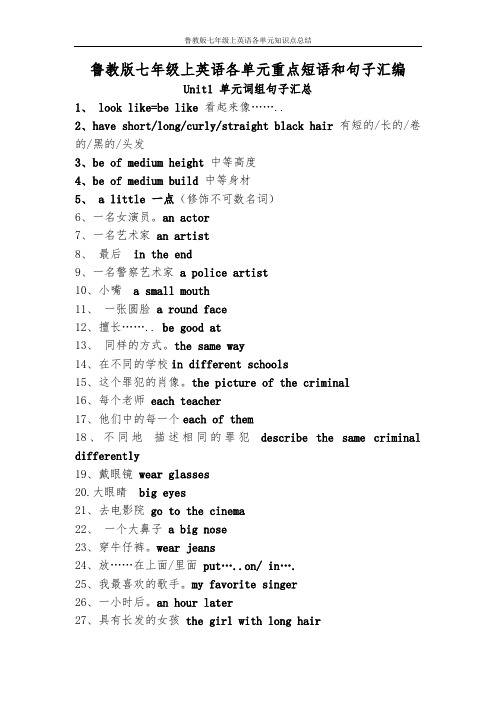
鲁教版七年级上英语各单元重点短语和句子汇编Unit1 单元词组句子汇总1、 look like=be like看起来像……..2、have short/long/curly/straight black hair有短的/长的/卷的/黑的/头发3、be of medium height中等高度4、be of medium build 中等身材5、 a little 一点(修饰不可数名词)6、一名女演员。
an actor7、一名艺术家an artist8、最后 in the end9、一名警察艺术家a police artist10、小嘴 a small mouth11、一张圆脸a round face12、擅长…….. be good at13、同样的方式。
the same way14、在不同的学校in different schools15、这个罪犯的肖像。
the picture of the criminal16、每个老师each teacher17、他们中的每一个each of them18、不同地描述相同的罪犯describe the same criminal differently19、戴眼镜wear glasses20.大眼睛big eyes21、去电影院 go to the cinema22、一个大鼻子a big nose23、穿牛仔裤。
wear jeans24、放……在上面/里面put…..on/ in….25、我最喜欢的歌手。
my favorite singer26、一小时后。
an hour later27、具有长发的女孩the girl with long hair28、戴眼镜的演员 the actor with glasses29、了解他know him well30、一份有趣的工作an interesting job31、首先 first of all32、记得很好remember well33、在报纸中in newspapers34、在电视上on TV35、晚一点儿 a little late重点句子:1、他长相如何?What does he look like?他中等高度.. He is of medium height.2、你妈妈长什么样?What does your mother look like?她有长的直的金黄色的头发。
鲁教版七年级上英语各单元重点知识提炼
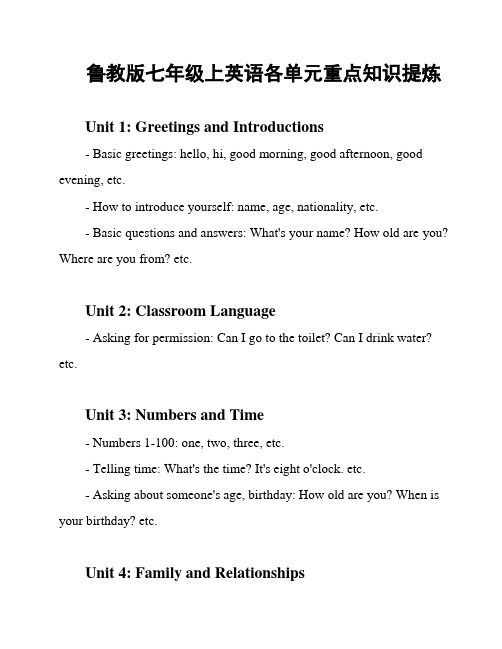
鲁教版七年级上英语各单元重点知识提炼Unit 1: Greetings and Introductions- Basic greetings: hello, hi, good morning, good afternoon, good evening, etc.- How to introduce yourself: name, age, nationality, etc.- Basic questions and answers: What's your name? How old are you? Where are you from? etc.Unit 2: Classroom Language- Asking for permission: Can I go to the toilet? Can I drink water? etc.Unit 3: Numbers and Time- Numbers 1-100: one, two, three, etc.- Telling time: What's the time? It's eight o'clock. etc.- Asking about someone's age, birthday: How old are you? When is your birthday? etc.Unit 4: Family and Relationships- Vocabulary related to family members: mother, father, sister, brother, etc.- Talking about family relationships: This is my sister. He is my father, etc.- Asking and answering questions about family: How many sisters do you have? Do you have any brothers? etc.Unit 5: Hobbies and Interests- Vocabulary related to hobbies and interests: singing, dancing, swimming, etc.- Talking about hobbies and interests: I like singing. He likes playing football. etc.- Asking and answering questions about hobbies: What's your hobby? Do you like swimming? etc.Unit 6: Food and Drinks- Vocabulary related to food and drinks: apple, banana, water, milk, etc.- Expressing likes and dislikes: I like apples. He doesn't like bananas. etc.- Ordering food and drinks: Can I have a hamburger, please? etc.Unit 7: Daily Routines- Vocabulary related to daily routines: wake up, brush teeth, have breakfast, etc.- Talking about daily routines: I wake up at 7 o'clock. He brushes his teeth after breakfast. etc.- Asking and answering questions about daily routines: When do you go to bed? What time do you have lunch? etc.Unit 8: School Life- Vocabulary related to school subjects: English, math, science, etc.- Talking about school activities: I have English class on Monday. He likes playing basketball during break time. etc.- Asking and answering questions about school: What's your favorite subject? When do you have P.E. class? etc.Unit 9: Shopping- Vocabulary related to shopping: clothes, shoes, bag, etc.- Talking about shopping: I want to buy a new dress. He needs new shoes. etc.- Asking for help and giving advice: How much is this T-shirt? Can you help me find a red bag? etc.Unit 10: Countries and Nationalities- Vocabulary related to countries and nationalities: China, Japan, American, etc.- Talking about countries and nationalities: I'm from China. She is Japanese. etc.- Asking and answering questions about nationalities: What's your nationality? Are you American? etc.Unit 11: Weather- Vocabulary related to weather: sunny, rainy, windy, etc.- Talking about the weather: It's sunny today. It's raining outside. etc.- Asking and answering questions about the weather: How's the weather today? Is it cold? etc.Unit 12: Festivals and Holidays- Vocabulary related to festivals and holidays: Christmas, New Year's Day, Spring Festival, etc.- Talking about festivals and holidays: I celebrate Christmas with my family. He likes watching fireworks on New Year's Day. etc.- Asking and answering questions about festivals and holidays: What do you do on Spring Festival? Do you like Halloween? etc.Unit 13: Transportation- Vocabulary related to transportation: car, bus, train, etc.- Talking about different modes of transportation: I go to school by bus. He likes traveling by train. etc.- Asking and answering questions about transportation: How do you go to work? Do you like driving? etc.Unit 14: Daily Life- Vocabulary related to daily life activities: cooking, cleaning, shopping, etc.- Talking about daily life activities: I help my mom with cooking. He cleans his room every weekend. etc.- Asking and answering questions about daily life: What do you do in your free time? Do you like shopping? etc.Unit 15: Health and Sports- Vocabulary related to health and sports: exercise, healthy, doctor, etc.- Talking about health and sports activities: I do exercise to stay healthy. He goes to see a doctor when he is sick. etc.- Asking and answering questions about health and sports: Do you play any sports? How often do you exercise? etc.以上是鲁教版七年级上英语各单元的重点知识提炼。
七年级上册鲁教版英语书u1知识点
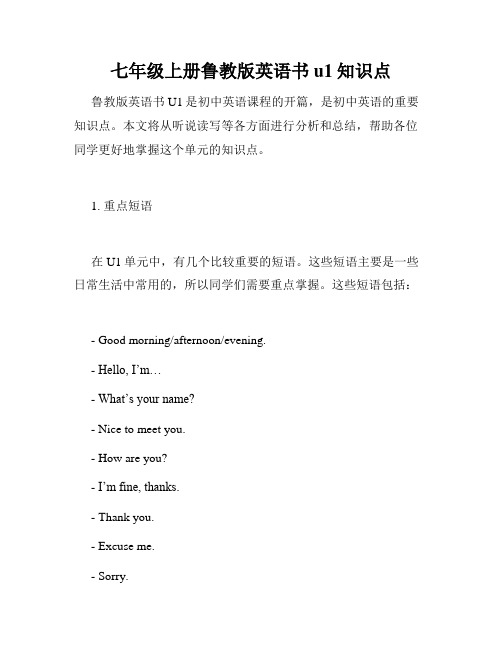
七年级上册鲁教版英语书u1知识点鲁教版英语书U1是初中英语课程的开篇,是初中英语的重要知识点。
本文将从听说读写等各方面进行分析和总结,帮助各位同学更好地掌握这个单元的知识点。
1. 重点短语在U1单元中,有几个比较重要的短语。
这些短语主要是一些日常生活中常用的,所以同学们需要重点掌握。
这些短语包括:- Good morning/afternoon/evening.- Hello, I’m…- What’s your name?- Nice to meet you.- How are you?- I’m fine, thanks.- Thank you.- Excuse me.- Sorry.- Please.2. 重点语法在本单元中,重点语法是be动词,包括am、is、are三种形式。
这些be动词的构成和使用方式如下:- am用于第一人称单数- is用于第三人称单数- are用于第二人称单数和复数另外,还需要注意对be动词的肯定、否定和疑问形式的构成和使用。
例如:- You are a student.(肯定句)- You are not a teacher.(否定句)- Are you a basketball player?(疑问句)3. 重点词汇在U1单元中,还有一些重要的词汇需要学生们掌握。
这些词汇主要涉及日常生活、学校、家庭、地理位置等方面。
这些词汇包括:- school(学校)- student(学生)- teacher(老师)- classroom(教室)- map(地图)- bedroom(卧室)- bathroom(浴室)- kitchen(厨房)- living room(客厅)4. 重点句型在本单元中,有一些重要的句型需要学生们重点学习。
这些句型主要是一些日常交流中比较常用的。
这些句型包括:- What’s your name?(你叫什么名字?)- I’m fine, thank you.(我很好,谢谢。
鲁教版初一英语上册unit1知识点总结:重点语法

鲁教版初一英语上册unit1知识点总结:重点语法
不定期的对知识点进行归纳总结,有利于知识点的掌握,初中频道给大家编辑了初一英语上册unit1知识点总结,供大家参考复习。
重点语法
1.–他看起来长得怎幺样?
--Whatdoeshelooklike?(有look,用does/do)
--他很高,而且他有短的卷头发。
--Heisverytall,andhehasshortcurlyhair.
①同义句:
--Whatishelike?(只有like,用is)(用is,like翻译问像”)
区别:
--Whatdoeshelike?他喜欢什幺?(用does,like翻译为喜欢”)
②区别比较:
(1)他是中等高度/身材:
Heisofmediumheight/build.(是of,前用be动词)
(2)他有中等高度/身材:
Hehasamediumheight/build.(是a,前用have/has)
2.她有一点点胖:
Sheisalittlebitheavy.(heavy是形容词,前用be动词)
①一点点+形容词:alittlebit+形容词=alittle+形容词=abit+形容词;
②一点点+名词:alittle+名词=abitof+名词;
如:
Hishairisalittlelong.=Hishairisabitlong.。
鲁教版初一上学期英语unit1知识点归纳:What does he look like?

鲁教版初一上学期英语unit1知识点归纳:What
does he look like?
每天坚持整理知识点,到考试时才能方便复习。
为大家整理了鲁教版初一上学期英语unit1知识点归纳,供大家参考阅读。
一.短语
1looklike看起来像....
2curly/short/straight/longhair卷/短/直发
3mediumheight/build中等高度/身体
4alittlebit=alittle=kindof一点儿„
5apopsinger一位流行歌手
6haveanewlook呈现新面貌
7goshopping(dosomeshopping)去购物
8thecaptainofthebasketballteam篮球队队长
9bepopularwithsb受某人欢迎
10stoptodosth停下来去做某事
11stopdoingsth停止正在做的事情
12telljokes/stories讲笑话/讲故事
13havefundoingsth愉快地做某事
14remember(forget)todosth记得(忘记)做某事(没有做的)
15remember(forget)doingsth记得(忘记)做过某事(已做)
16oneof------中的一个
17.be+高矮胖瘦
18.whatdo/doeslooklike?=what+be+sb.+like?询问某人的外貌。
七上英语一二单元重点(鲁教版)

七上英语Unit 1 What does he look like?他长什么样?A重点单词及短语straight height heavy little glasses person singer put way real tall thin build(中等身材) cinema handsome round artist each anotherBe of medium build/height alittlein the end=at last=finallyWhat does he look like?He’s really tall.Do they have straight or curly hair?They have durly hair.Is he tall or short?He isn’t tall or short. He’s of medium build.tall 人动物数建筑物的高a tall buildingtall 多指山高抽象意义上的高价格速度温度反义词为low a high mountain high pricesHe is two meters in height.=He is two meters tall. Look like 看起来像He lokks like his father.Be like 像What does he like ?He is very friendly.Go to the movie go to the meetinggo to school go to bed go fishinggo swimming go shoppingI may be a little late.Maybe=perhaps Maybe he is a teacher.There is a little milk in the glass,There is little water in the cup.She has a few friends.She has few friends.例如:-There is __ milk in the fridge.Please buy some on your way home.-All right.She has brown hair and wears glasses.See you later then.handsome beautiful pretty good-looking What does your favorite actor or actress look like? This person is of medium build.person peopleThere are three persons in their team.There are many people at the party.例如:There are too many p_______ in a bus and the air in it is dirty.I choose to travel by train.SECTION BSome people see crimes and then talk to Joe.Talk to talk about talk withThey tell him what the criminal look like.从句陈述句语气Tell sb to do sthTell a story/lieAnd the police put it in nespaper and on television to find him.Put on put away put up put down例如- It’s too cold tody-Yes,Why don’t you ____ your coat.He wants to draw a good picture of each criminal,but this job is sometimes difficult.Each of the students has a new bike.Every student has a new bike.Many people don’t always see things the same way so the may describe the same person differently.如果way前面有this that 等限定词,in可以省略。
- 1、下载文档前请自行甄别文档内容的完整性,平台不提供额外的编辑、内容补充、找答案等附加服务。
- 2、"仅部分预览"的文档,不可在线预览部分如存在完整性等问题,可反馈申请退款(可完整预览的文档不适用该条件!)。
- 3、如文档侵犯您的权益,请联系客服反馈,我们会尽快为您处理(人工客服工作时间:9:00-18:30)。
鲁教版英语七年级上
U n i t1-2知识点总结-CAL-FENGHAI.-(YICAI)-Company One1
语法知识
1.现在进行时态:
结构:主语+be动词+动词ing+其他
2. 现在分词的构成规则如下:
1)一般动词后直接加-ing.如: reading, watching, seeing
2)以不发音的e结尾的词去掉e再加-ing. 如: make—making write—writing
3)以重读、闭音、单辅音字母结尾的词,双写这个辅音字母,再加-ing.
如: get-getting swim-swimming put-putting run-running
3.用法:
1)表示现在(说话瞬间)正在进行或发生的动作。
(不能指状态。
)
2)表示现阶段正在进行,而此刻不一定在进行的动作。
(以these days为代表)
3)表即将发生的动作。
这类词有:come, go, leave, arrive等,常与表将来的时间状语连用。
4.常见标志:
1) 句中有:now, at the moment,these days, look,listen等如:
He is doing his homework now.
Look, what is the girl drawing
5. 现在进行时的一般疑问句及回答:一般疑问句把be动词提前;回答用Yes,主语+be或No, 主语+be+no t。
如:
Are you making the bed Yes, I am.
Is the girl drawing a picture No, she isn’t.
6. 现在进行时的否定句:在be动词后加not。
如:They are cleaning the classroom.
→They aren’t cleaning the classroom.
7. 对现在进行时的谓语动词提问,常用“what…doing”。
如:He is reading a book.
→What is he doin g .
重点词组
wait for等候
talk to与…… 谈话
talk about谈论
go to the movies去看电影
write a letter写一封信
reading a book看书
here is a photo of my family .这是我家的一张照片
in the next photo 在下张照片上
play basketball 打篮球
watch TV 看电视
play computer games 玩电脑游戏
take photos 照相
play the guitar 弹吉他
have a good time=have fun =have a good time 玩的开心
重点句子
1.What are you/they doing你们/他们在做什么
2.
3.What is he/she doing他/她在做什么
4.
5.I'm watching TV. 我正在看电视。
6.He's doing homework. 他正在做作业。
7.She 's writing a letter. 他正在写信。
8.My mother is talking to my father. 我妈妈正在和我爸爸谈话。
9.Thanks for your letter. 感谢你的来信。
10.Look,they are swimming in the pool. 看,他们正在湖里游泳。
11.Listen,Lucy is singing. 听,露西在唱歌。
12. I'm waiting for my sister. 我正在等我的姐姐。
11.Mary is playing computer games. 玛丽正在玩电脑游戏。
Unit 2 It's raining.
1.--How's the weather in Beijing=what's the weather like in Beijing 北京的天气怎么样
-- It's sunny/cloudy/rainy/snowy/windy....
2.--How is it going进展的怎么样
3.
--Great.非常好。
/Not bad. 不错./Terrible!很糟糕 /Pretty good.很好。
4.Some people are taking photos. Others are lying on the beach. 一些人正在照照片,其他人躺在沙滩上。
5.This is a very interesting place.这是一个有趣的地方。
6.I am surprised they can play in this heat.我对他们能在这么炎热的天气玩感到很惊讶。
